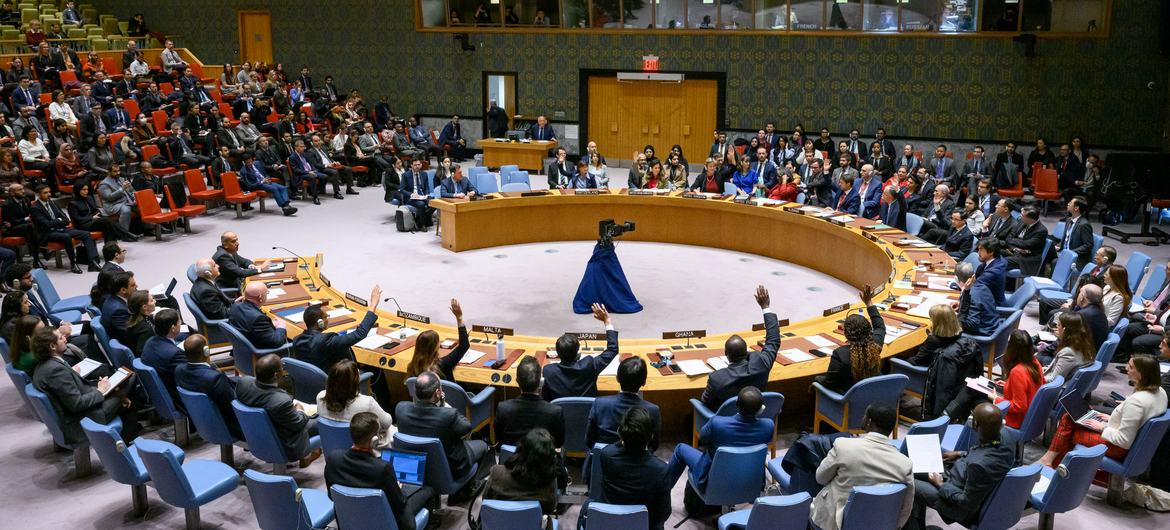
New York - Saba:
The UN Security Council held a meeting this evening, Tuesday, on the situation in the Middle East, including the Palestinian issue and the deteriorating humanitarian situation in the Gaza Strip.
The meeting was chaired by the Representative of Greece to the United Nations, Evangelos Sekeris, whose country holds the rotating presidency of the Council this month.
The Council heard briefings from Under-Secretary-General for Humanitarian Affairs Tom Fletcher and Angelica Jacom, Director of the Food and Agriculture Organization of the United Nations (FAO) Office in New York.
In his briefing, Fletcher told Council members: "Before we begin, I ask you to reflect for a moment on the work we will tell future generations that each of us has done to stop the 21st-century horrors we witness daily in Gaza."
Fletcher added that Israel "deliberately and shamelessly imposes inhumane conditions" on civilians in the occupied Palestinian territory, stressing that "every one of the 2.1 million Palestinians in the Gaza Strip faces the threat of starvation."
He said: "We have strict mechanisms to ensure our aid reaches civilians, but Israel is denying us access, putting its goal of depopulating Gaza before the lives of civilians."
He called on the occupying authorities to stop killing and wounding civilians, lift this "brutal blockade," and allow humanitarian workers to save lives.
For her part, Angelica Jacom, Director of the Food and Agriculture Organization of the United Nations (FAO), emphasized that the situation in Gaza is extremely dire, with millions of people facing severe food insecurity and "the risk of famine is imminent." She pointed to the latest Integrated Food Security Phase Classification report, which confirmed that all residents of Gaza remain at risk of famine.
In her briefing to the Council, she said, "We are witnessing a systematic collapse of the basic conditions for survival. The people of Gaza are not only suffering from food shortages, but also from a profound collapse of their health, livelihoods, and social fabric, leaving entire communities in despair, devastation, and death."
She warned that agricultural food systems in the Gaza Strip have collapsed, food prices have risen sharply, and local food production has been devastated.
Jakum said, "By the time famine was declared, people were already dying of hunger, with irreversible consequences that will last for generations. The opportunity to help is now."
The Zionist enemy resumed its aggression and tightened blockade of the Gaza Strip at dawn on March 18, 2025, after a two-month pause under a ceasefire agreement that went into effect on January 19. However, the enemy violated the terms of the agreement throughout the period of calm.
Since October 7, 2023, with American and European support, enemy forces have been committing genocide in the Gaza Strip, resulting in more than 172,000 Palestinian deaths and injuries, most of them children and women, in addition to more than 14,000 missing persons.
The UN Security Council held a meeting this evening, Tuesday, on the situation in the Middle East, including the Palestinian issue and the deteriorating humanitarian situation in the Gaza Strip.
The meeting was chaired by the Representative of Greece to the United Nations, Evangelos Sekeris, whose country holds the rotating presidency of the Council this month.
The Council heard briefings from Under-Secretary-General for Humanitarian Affairs Tom Fletcher and Angelica Jacom, Director of the Food and Agriculture Organization of the United Nations (FAO) Office in New York.
In his briefing, Fletcher told Council members: "Before we begin, I ask you to reflect for a moment on the work we will tell future generations that each of us has done to stop the 21st-century horrors we witness daily in Gaza."
Fletcher added that Israel "deliberately and shamelessly imposes inhumane conditions" on civilians in the occupied Palestinian territory, stressing that "every one of the 2.1 million Palestinians in the Gaza Strip faces the threat of starvation."
He said: "We have strict mechanisms to ensure our aid reaches civilians, but Israel is denying us access, putting its goal of depopulating Gaza before the lives of civilians."
He called on the occupying authorities to stop killing and wounding civilians, lift this "brutal blockade," and allow humanitarian workers to save lives.
For her part, Angelica Jacom, Director of the Food and Agriculture Organization of the United Nations (FAO), emphasized that the situation in Gaza is extremely dire, with millions of people facing severe food insecurity and "the risk of famine is imminent." She pointed to the latest Integrated Food Security Phase Classification report, which confirmed that all residents of Gaza remain at risk of famine.
In her briefing to the Council, she said, "We are witnessing a systematic collapse of the basic conditions for survival. The people of Gaza are not only suffering from food shortages, but also from a profound collapse of their health, livelihoods, and social fabric, leaving entire communities in despair, devastation, and death."
She warned that agricultural food systems in the Gaza Strip have collapsed, food prices have risen sharply, and local food production has been devastated.
Jakum said, "By the time famine was declared, people were already dying of hunger, with irreversible consequences that will last for generations. The opportunity to help is now."
The Zionist enemy resumed its aggression and tightened blockade of the Gaza Strip at dawn on March 18, 2025, after a two-month pause under a ceasefire agreement that went into effect on January 19. However, the enemy violated the terms of the agreement throughout the period of calm.
Since October 7, 2023, with American and European support, enemy forces have been committing genocide in the Gaza Strip, resulting in more than 172,000 Palestinian deaths and injuries, most of them children and women, in addition to more than 14,000 missing persons.